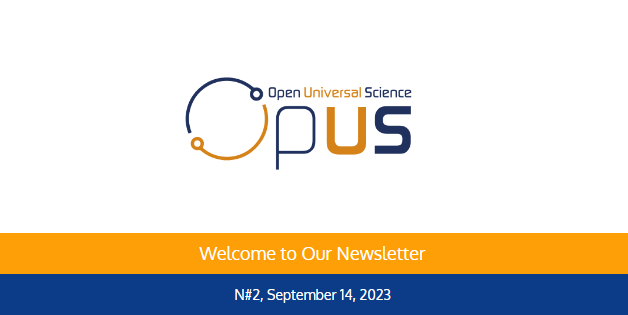
2nd Edition of OPUS Newsletter
2nd Edition of OPUS Newsletter https://opusproject.eu/wp-content/uploads/2023/09/zut-2.png 628 315 Open and Universal Science (OPUS) Project Open and Universal Science (OPUS) Project https://opusproject.eu/wp-content/uploads/2023/09/zut-2.pngYour Voice Matters in the Evolution of Open Science
In the ever-evolving landscape of scientific research, one thing remains constant: the need for innovation, inclusivity, and recognition. Researchers worldwide are consistently pushing the boundaries of human knowledge, contributing to a collective pursuit of understanding. As we embark on this exciting journey, it becomes increasingly crucial to assess and reward research efforts in ways that truly reflect the principles of Open Science.
Join the OPUS Survey in Shaping Research Assessment
The Open Science community is buzzing with excitement as the OPUS project takes center stage in the quest to revolutionize research assessment. OPUS, which stands for Open and Public Understanding of Science, aims to empower researchers and research organizations with innovative ways to assess and reward research endeavors while embracing the ethos of Open Science.
We understand that every researcher’s voice matters, and that’s why we invite you to join us in this groundbreaking initiative. By participating in the OPUS survey, you become an active contributor to the shaping of a more inclusive, fair, and rewarding research landscape. Your insights can drive the development of assessment frameworks that better align with the values of Open Science.
Survey Link: Join the OPUS Survey
Innovative Ways to Reward Researchers: Making Research Outputs More Accessible
The heart of the OPUS project lies in redefining how we evaluate research outcomes. Traditional metrics and evaluation methods often fall short in recognizing the broader impact of research and the principles of Open Science. OPUS seeks to change that.
A Game-Changer for Research Evaluation
Introducing the OPUS Research Assessment Framework
One of the key challenges in Open Science is finding effective ways to assess researchers for career progression and grant applications. The OPUS Research Assessment Framework is designed precisely for this purpose. It offers a carefully crafted set of indicators and interventions aimed at fostering Open Science practices within research organizations.
By explicitly recognizing and incentivizing Open Science practices, this framework not only promotes quality research but also encourages transparency, collaboration, and accessibility in the scientific community.
Review the Final Draft of the UNESCO Open Science Outlook until Sept 15th!
Join UNESCO in Shaping the Future of Open Science!
In addition to the OPUS project, UNESCO is also actively involved in shaping the future of Open Science. They invite experts and stakeholders, including researchers like you, to review the final draft of the UNESCO Open Science Outlook. This is a golden opportunity to have your say in the global conversation surrounding Open Science. Your input can help guide the future direction of this transformative movement.
Learn More: UNESCO Open Science Outlook
Future Events
As the Open Science movement gains momentum, there are exciting events on the horizon that you won’t want to miss:
OPUS at the upcoming EOSC Symposium 2023
Last Day to Register for Online Participation at EOSC Symposium
From September 20th to 22nd, 2023, the EOSC Symposium will take place in Madrid, Spain, under the umbrella of the Spanish Presidency of the Council of the European Union. Organized by the EOSC Future project and the EOSC Tripartite collaboration, this event promises to be a gathering of minds passionate about Open Science.
If you haven’t registered yet, don’t miss your chance to participate online and connect with fellow researchers and innovators.
Learn More: EOSC Symposium 2023
OPUS Blog
Stay informed and engaged with the latest developments in Open Science by reading our blog. Here are some recent articles you might find interesting:
August 9, 2023
Navigating the Open Science Landscape: Where to Find Open Science Resources
This article explores a diverse range of platforms that offer researchers, students, and enthusiasts ample opportunities to engage with open science resources. Discover the tools and repositories that can enhance your research journey.
August 15, 2023
How to Share and Ensure Reproducibility of Data
In an era where data-driven insights drive progress, sharing data and promoting reproducibility are not just best practices – they are ethical imperatives that foster innovation and promote trust within the scientific community. Learn how to ensure the integrity of your research data.
Stay in the loop and follow us on social media for daily blog updates and news. Together, we can shape the future of Open Science.
Remember, your voice matters, and your contributions can help pave the way for a more inclusive, fair, and rewarding research landscape. Join us in the OPUS survey, participate in the upcoming events, and stay informed through our blog. Together, we can empower Open Science and create a brighter future for research.
- Posted In:
- OPUS News




